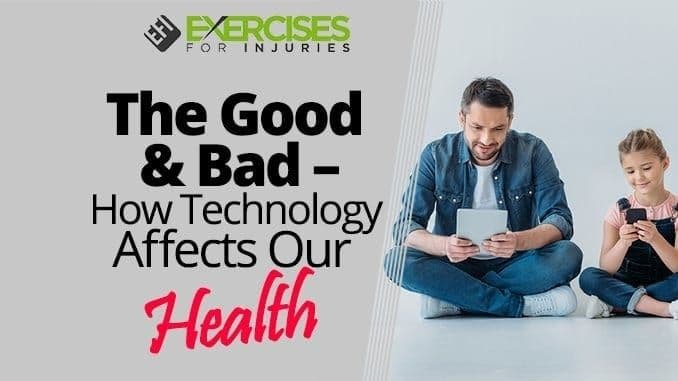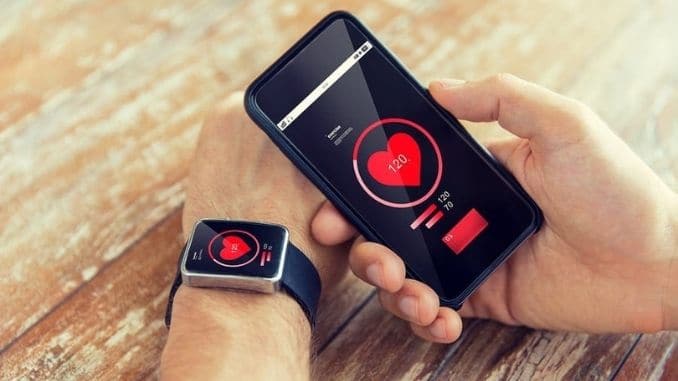
Is your smartphone doing you more harm than good or could it be a lifesaver? It all depends on how you look at it. Nobody can deny that technology affects health and occupies a big place in our lives ― but is it good for us? In this article, we’ll look at both sides of the argument and see if we can come to a conclusion. Some of what you’ll read is stranger than fiction ― while other findings are more like a scary movie.
The Hyperfast Growth of Technology and How It Affects Health
Back in 1975, the fastest supercomputer cost $5 million. Now, you can get an iPhone with even greater computing power for about $500. The tech boom also caused a massive economic surge across the globe. It comes as no surprise then that the healthcare sector has seen tremendous activity in medical-related technology. In fact, by the year 2020, the global medtech industry is predicted to be worth $477.5 billion. So, is all that money making life any better? In some cases, it’s nearly miraculous.
Amazing Wearables
You might remember the Polar heart rate monitor that you wore strapped to your chest. Things have now moved ahead light years. Today, wearable wristbands like fitness trackers not only can monitor your heart rate, but they also measure blood pressure, electrocardiogram and breathing rate. There’s even clothing embedded with sensors to help monitor vital signs and other health-related data. World Media & Technology Corporation has developed a watch that can provide blood sugar estimates based on the composition of your sweat.
The Empatica Embrace watch ― developed by scientists at the Massachusetts Institute of Technology ― can even detect when someone has a seizure. This is accomplished by detecting motion and also electrodermal activity (EDA). If you get stressed or nervous, your skin conductance ― or EDA ― increases, and the watch can measure this. All of this data can be connected by Bluetooth and cellphone signals to alert caregivers when a seizure occurs.
Out-of-This-World Implantables
The concept behind wearables penetrates even further when we consider implantable medical devices. This idea is far from new as heart pacemakers have been around since 1958. Still, today’s implantable research may be stranger than fiction if we consider things like bioelectronics.
Galvani Bioelectronics is a joint effort between GlaxoSmithKline and Verily (a division of Google’s parent company Alphabet Inc.). Galvani is busy working on creating tiny devices that can be implanted on human nerves. These micromachines can modify nervous system signals, which may help fight disease. For example, if a device could be placed on airway nerve endings, this could mean the end of asthma attacks.
3D Print Everything
By now, everybody’s heard about three-dimensional printing, also known as additive manufacturing. You download a pattern, and you can print parts to machines or anything else for that matter. This could be a great help in the area of prosthetics. For example, artificial limbs could not only be printed at a distance, but they could also be customized to fit anyone perfectly.
Scientists have taken this concept of “printing anything” quite seriously. Don’t believe it? Then, consider that real-world advances have been made in printing medications, tiny artificial inner ear bones and even human ear cartilage.
Healthcare App Explosion
How technology affects health: Even beyond the cutting-edge science, everyday smartphone apps are making a difference in people’s health. There are hundreds, if not thousands, of apps available that provide:
- Workout programs
- Weight-loss plans
- Healthy eating guides
- Stop smoking reminders
- Personal health care data storage
- Blood sugar and diabetes care
- Meditation and brain health guides
- Information about illness and disease
- Sleeping aids
Even more amazing are apps that can use image captures to help make medical diagnoses. Some of these can also be outfitted with thermometers to follow vital signs. There’s even an app that can turn your smartphone into an ultrasound machine with the help of a plugged-in ultrasound wand. Finally, if you want to learn how to do an appendectomy, there are surgical teaching apps that can train surgeons nearly any place on Earth.
The Dangers of Technology
How technology affects health: Every great power can have good and bad effects. Even too much oxygen can lead to lung tissue fibrosis and scarring. Technology is no different, and the effects might be devastating. Let’s look at some examples where tech can hurt you.
Facebook Might Make You Sick
The average Facebook user spends about an hour on the site each day. Many people check their social media first thing in the morning and right before they go to bed. If they get an alert, they reach for their phone almost like a reflex. Unfortunately, uncontrolled use of social media may:
- Decrease your face-to-face relationships
- Lead to less time spent in meaningful activities
- Increase sedentary behavior
- Encourage internet addiction
- Damage self-esteem due to negative social comparison
The last point is especially worrisome as many people lurk around on social media without ever interacting. They see how great other people’s lives seem to be, which makes them feel depressed about their own reality.
Holly B. Shakya is an Assistant Professor of Global Public Health at the University of California San Diego. She specializes in social network analysis and social norms theory. Recently, she conducted a Facebook well-being study along with her colleague, Nicholas A. Christakis, director of the Human Nature Lab at Yale University. Their results showed that using Facebook was negatively associated with overall well-being.
How Screen Time Might Hurt You
Here are several theories behind how technology affects health. One possibility is that every time you get a ‘like” or notification, your brain releases dopamine. This neurotransmitter gets released in response to any stimuli that makes you happy. The problem is that the high you get from many “likes” may become more important to you than real-life affection. Plus, since you get near instant gratification from social media, you keep going back to the screen to get your dopamine fix.
All this may lead to an increased dependency on social media at the expense of real-world relationships. Eventually, however, this catches up to you, and you end up not feeling so good about yourself and the world around you.
Some other negative effects of the overuse of technology may be:
- Obesity
- Sleep disorders
- Victimization (bullying)
- Pollution
Physical Effects
Beyond the potential psychological toll that devices might have on your life, physical damage can occur as well. We’ve already mentioned problems with weight control, which goes beyond just social media and smartphones. We all know that technology has increased our level of comfort. Now, we barely have to lift a finger to do anything. Still, spending hours at a time on a smart device could also lead to:
- Joint pain in the hands and arms
- Stiff neck and headache
- Low back pain
- Eye problems
Effects on Children and Teens
Many studies have been done on children and adolescents regarding their interaction with technology and social media. Some of the effects may include problems with learning and attention span. Others report an increased level of violence in kids that play too many violent video games. Also, the development of social skills may be stunted if children spend too much time on the screen instead of interacting in real life situations.
How to Protect Yourself
Even though technology has its risks, it’s also very useful. It can help with planning and communication unlike ever before. The key is to use it wisely. Here are some tips that can help keep you safe:
- If you work on a computer, take 10- to 15-minute breaks every hour or so; set an alarm to remind you
- Don’t sleep with your smartphone close to your head
- Take digital holidays where you spend the entire day without being online
- Consciously organize real-life meetings with people ― even if you don’t have to
- Participate in team sports or exercise
- Educate yourself and be aware of the risks
- Read paper books, and don’t check your social media at the same time
- Go back to using a paper calendar instead of one online
- Eat meals with others and have a “no smartphone” rule during mealtime
Conclusion
Technology itself is not good or bad. Instead, it depends on how it’s used. If you make the right choices and stay informed, you can do great things. Be aware of the dangers and take steps to keep you and your loved ones safe.
If you want to discover nature’s secret remedies for healing and fat burning, then check out the Best Foods That Rapidly Slim & Heal in 7 Days program, here!




